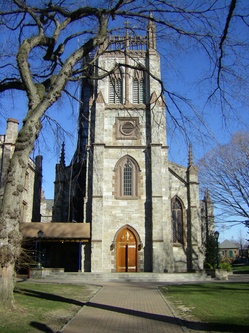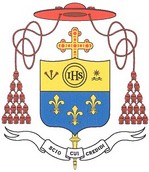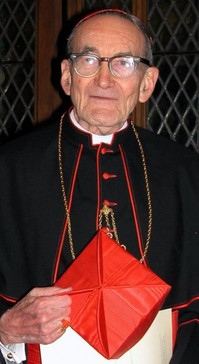
Yesterday, about 50 friends of Avery Cardinal Dulles met at Fordham University Church to remember him before God on the occasion of his first anniversary of death.
Sister Anne-Marie Kirmse, O.P., the Cardinal's friend and administrative assistant, gathered us for Mass celebrated by Jesuit Father Joseph McShane with the homily delivered by Jesuit Father Joseph Leinhard. There were 17 concelebrants; three of whom were secular priests (friends of Dulles') and the balance were old Jesuits. Five of the Cardinal's Fairfield County Communio group (myself included) were present as the faithful remnant. As was recognized, we all miss the Cardinal's wisdom, affection and much understated humor.
In his homily Father Leinhard focused our attention on the moment by recalling Saint Augustine's 9th book of the Confessions where Augustine tells us of his mother's passing unto eternal life. In between her various states of consciousness and unconsciousness Monica came to a see life anew. She called her sons together telling them when she died to bury her body anywhere but to remember her before the Lord, wherever they may be. As for Monica, so for Avery.

Why remember? Our thinking of Cardinal Dulles is, as Fr. Leinhard said, wholly different than what went before. Remembering Avery before God is not quite the same as reminding God who Avery was, just in case God may have forgotten. What is important about Avery is not his prestigious family, his education, his conversion to Catholicism, his entrance into the Society of Jesus nor his ordination to the priesthood, not even his ministry as a theologian nor his acceptance of the dignity of the Cardinalate. What is important about Avery is encapsulated in the motto he assumed with the coat of arms when given the cardinal's hat by Pope John Paul II, Scio Cui Credidi, I know whom I have believed.

The reading from 2 Timothy 1 can be taken as Saint Paul's last will and testament as it is his answer to a question of belief: Christ has resurrected from the dead and I have preached his gospel. For both Saint Paul and Cardinal Dulles their lives deeply changed in making an act of faith in Christ for Christ became the key to all understanding. In Dulles' Craft of Theology, the last sentence of chapter 1 speaks to his belief in Christ where he recounts a vision of Christ in which we look past the "now" and look to Christ as the center of all things.
At the altar of the Lord we pray for the dead following the ancient Christian practice. In the Roman Canon of the Mass we pray that the Lord will remember "those who have gone before us marked with the sign of faith" granting them the blessedness (happiness) of light and peace. Our liturgical prayer places hope in our hearts that those who sleep in the Lord will have the victory over sin and death. Our confidence relies on the sign of faith received in baptism, that which marks each person not with a pious sign but with indelible mark.
Our remembrance of Avery and of every one of our beloved dead therefore, is brought home in the consideration that not to remember is to consign our family and friends to oblivion is awful. The Christian proposal is lux perpetua: light for the blind, peace for the will.
Eternal rest grant unto Avery Cardinal Dulles, O Lord, and let perpetual light shine upon him. May his soul and the souls of the faithful departed rest in rest. Amen.

A sentimental
remembrance of Cardinal Dulles was the hanging of a cardinal's red hat and
tassels. No longer given by the Pope to cardinals, the red hat is occasionally
made for a cardinal and hung in his church by his family and friends. In New York's Saint Patrick's
Cathedral there are 4 cardinal hats hanging (but none since Cardinal Spellmen
are hanging there). The Archdiocese of Chicago did the same for Cardinal Joseph
Bernardin back in 1997.


Leave a comment